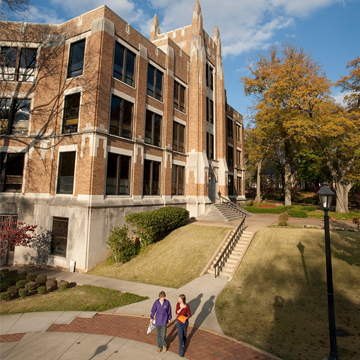Areas of Specialization
Students customize their MPrS degree by choosing from one of four areas of specialization: Higher Education Administration, Community Development, Security and Safety Leadership, or Information Technology. Students select up to 12 credit hours of graduate coursework individually suited to their chosen area of concentration. These courses are taken along with the professional studies core component coursework to complete the MPrS degree (see Degree Requirements).
Higher Education Administration
 This specialization is designed for students whose career path puts them squarely within two or four-year systems of higher education. Courses have been developed focusing on student development and student affairs, enrollment management and institutional marketing, NCAA athletics, contemporary and legal issues, administrative organization, budgetary planning, institutional evaluation, and the Community College system. All courses are taught online by seasoned higher education professionals. The concentration is ideal for those currently employed in higher education and undergraduate students who derived satisfaction and purpose from their involvement in campus life.
This specialization is designed for students whose career path puts them squarely within two or four-year systems of higher education. Courses have been developed focusing on student development and student affairs, enrollment management and institutional marketing, NCAA athletics, contemporary and legal issues, administrative organization, budgetary planning, institutional evaluation, and the Community College system. All courses are taught online by seasoned higher education professionals. The concentration is ideal for those currently employed in higher education and undergraduate students who derived satisfaction and purpose from their involvement in campus life.
Community Development
 This is a unique specialization as students are free to approach their studies in terms of macro-level economic development issues or more micro-level issues focused on unique population needs or human/social capital development. Students can acquire the ability to work with citizens and community leaders to establish and help maintain viable and sustainable communities, improve human and social capital and help individuals and communities to reach their full potential. The concentration will be appropriate for students planning careers in both the private and public sectors.
This is a unique specialization as students are free to approach their studies in terms of macro-level economic development issues or more micro-level issues focused on unique population needs or human/social capital development. Students can acquire the ability to work with citizens and community leaders to establish and help maintain viable and sustainable communities, improve human and social capital and help individuals and communities to reach their full potential. The concentration will be appropriate for students planning careers in both the private and public sectors.
Security and Safety Leadership
 This specialization is designed to meet the professional development needs of students involved in the public or private safety sector. It is specially designed for students with experience or interest in law enforcement, the military, emergency management, disaster relief, corporate security, transportation security, public safety, hazards management, public health preparedness, and fire security. Students will gain familiarity with a wide range of homeland security issues, practices, and policies, including homeland security management, emergency response and disaster relief, inter-agency cooperation, leadership and performance management, the management of organizational change, and intelligence and strategic analysis. Students will graduate from the program with the ability to enhance the quality of life at community, regional, and national levels.
This specialization is designed to meet the professional development needs of students involved in the public or private safety sector. It is specially designed for students with experience or interest in law enforcement, the military, emergency management, disaster relief, corporate security, transportation security, public safety, hazards management, public health preparedness, and fire security. Students will gain familiarity with a wide range of homeland security issues, practices, and policies, including homeland security management, emergency response and disaster relief, inter-agency cooperation, leadership and performance management, the management of organizational change, and intelligence and strategic analysis. Students will graduate from the program with the ability to enhance the quality of life at community, regional, and national levels.
Information Technology
 This specialization is designed to provide students with a broad understanding of current and evolving technologies in the applied Information Technology (IT) field. Students will gain knowledge and skills enabling them to understand the principles underlying IT, understand technical and regulatory issues related to IT, apply IT best practices to enhance competitiveness and increase productivity, integrate IT into organizations, enhance IT awareness and literacy in organizations, and manage software and hardware cycles. This concentration will prepare students for careers in database systems management, informatics, information security, project management, software engineering, telecommunications management, and e-business development.
This specialization is designed to provide students with a broad understanding of current and evolving technologies in the applied Information Technology (IT) field. Students will gain knowledge and skills enabling them to understand the principles underlying IT, understand technical and regulatory issues related to IT, apply IT best practices to enhance competitiveness and increase productivity, integrate IT into organizations, enhance IT awareness and literacy in organizations, and manage software and hardware cycles. This concentration will prepare students for careers in database systems management, informatics, information security, project management, software engineering, telecommunications management, and e-business development.
Students are encouraged to email or speak directly with Dr. Craig Robertson regarding their educational goals relative to the areas of specialization. Specialization coursework must be approved within the completion of the first 12 credit hours of this degree program.